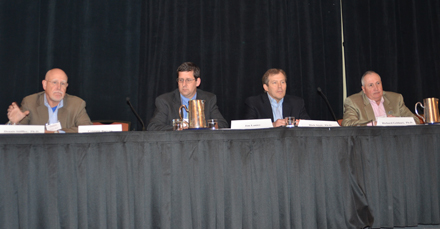
From left: Dennis Stiffler, Jim Lanier, Rick Stott, Richard Gebhart photo by Kasey Miller
ILC–USA 2012
How Do We Define Sustainability?
by Troy Smith for Angus Productions Inc.
DENVER (Jan. 10, 2012) — A generally accepted definition of “sustainability” suggests the term applies to a state of balance among economic, social and environmental concerns. Just how the beef industry will maintain sustainability, while striving to feed a rapidly growing world population, was discussed during the International Livestock Congress–USA 2012 in Denver, Colo, Jan. 10. Panelists representing cattle production, meatpacking, retail and foodservice segments shared their views regarding the meaning of sustainability.
Oklahoma producer Richard Gebhart said social aspects too often detract consideration of the other elements or distort views regarding the environment. Also a lawyer and college instructor, Gebhart said sustainability in any business is the result of good stewardship — making responsible decisions after weighing all costs and benefits.
“I know of no greater moral responsibility than ranching — taking care of land and cattle,” stated Gebhart, “but consideration of the economic aspect is what makes it possible to stay in business."
Speaking for vertically integrated AgriBeef, executive vice president Rick Stott said it has become important for the Idaho-based firm to relate sustainability to consumers at a social level. However, Stott also said companies can’t produce desirable consumer products and do good things for the environment if they aren’t profitable.
“Often missing from discussion about sustainability is the economic aspect,” said Stott. “The business of food production isn’t sustainable if it doesn’t make money.”
Representing the Texas grocery chain H-E-B, Jim Lanier said he believes it’s becoming increasingly important to foster strong feelings, internally, regarding sustainability.
“It’s an emotional thing that needs to be built into the business culture. If it’s just a marketing ploy, the company won’t be around long,” said Lanier.
As a foodservice supplier of lamb and veal, Mountain States Rosen representative Dennis Stiffler said sustainable food production involves applying ecologically sound principles that conserve resources while supporting quality of life, in concert with economics to promote longevity. But consumers are bombarded with half-truths and misinformation about how food — and especially meat — is grown, processed and delivered. Stiffler said every segment of food production needs to communicate more effectively with consumers, to eliminate confusion and build trust.
“We all have a story we can tell,” he insisted. “And that’s where we create the value of a product.”
For additional coverage of ILC–2012, return to the ILC index page.
Editor’s Note: The above article was written under contract or by staff of Angus Productions Inc. (API). It may not be reprinted without express permission of API. To request reprint permision, contact the editor at 816-383-5200.
This section of the API Virtual Library contains event coverage provided by the editorial team at Angus Productions Inc. (API), publisher of the Angus Journal, the Angus Beef Bulletin, the Angus Beef Bulletin EXTRA and the Angus e-List. For questions about this site, to submit an article for our consideration, or to report a broken link, contact the editor at 816-383-5200; 3201 Frederick Ave., Saint Joseph, MO 64506.
API claims copyright to this website as presented. We welcome educational venues and cattlemen to link to this site as a service to their audience.






